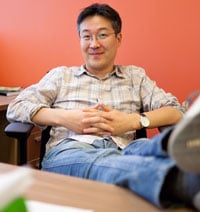 The tighter funding gets, the more likely it is that young investigators pursuing big ideas will get passed over and science grant money will stay with safer, more established projects. Fortunately there are exceptions to that general rule, including a new program established by the Paul G. Allen Family Foundation specifically to support select pioneering research projects that aim to unlock fundamental questions in biology. They recently awarded investigators from 5 prestigious US universities a total of $7.5M to pursue basic questions about the origins and mechanisms of cellular behavior. One of those 5 Distinguished Investigator awards, for $1.6M, is going to quantitative biologist and recent hire Suckjoon Jun, who works in physics and molecular biology at the University of California San Diego. His project title is "Cell-size control and its evolution at the single-cell level," and includes developing methods to perform long-term directed single-cell evolution experiments, as well as single-cell on-chip manipulation, sequencing, and mathematical modeling.
The tighter funding gets, the more likely it is that young investigators pursuing big ideas will get passed over and science grant money will stay with safer, more established projects. Fortunately there are exceptions to that general rule, including a new program established by the Paul G. Allen Family Foundation specifically to support select pioneering research projects that aim to unlock fundamental questions in biology. They recently awarded investigators from 5 prestigious US universities a total of $7.5M to pursue basic questions about the origins and mechanisms of cellular behavior. One of those 5 Distinguished Investigator awards, for $1.6M, is going to quantitative biologist and recent hire Suckjoon Jun, who works in physics and molecular biology at the University of California San Diego. His project title is "Cell-size control and its evolution at the single-cell level," and includes developing methods to perform long-term directed single-cell evolution experiments, as well as single-cell on-chip manipulation, sequencing, and mathematical modeling.
[Dr. Suckjoon Jun of UCSD, photo by Calvin Feng]
In a Q&A session with the Allen Foundation regarding the award and his work, Dr. Jun explains how he ended up in his particular area of research:
"A few years ago we developed a micro device to isolate and physically manipulate individual genetic materials. It turned out that we can use the same device, now known as the 'mother machine', also to follow the life history of thousands of individual bacterial cells for hundreds of generations. We looked at the growth patterns of the cells very, very carefully, and realized that there is something really special about the way the cells control their size."
The reason work like Jun's is referred to as "risky" has nothing to do with danger and everything to do with immediate application. The more basic the research, the newer the tools, and the younger the scientist, the more unknown factors there are. Unless a young investigator can ride in on the lab coattails of an established senior investigator, funding is likely to be scarce and opportunities fewer. Fortunately, Dr. Jun had the support, via letters of recommendation, of several noted UCSD faculty who saw the importance of the work and the unique vision of someone early in a very promising career.
It helps too that the Allen Foundation was started by a Microsoft pioneer who admits he has always been "drawn to the big questions of science," and knows that "pioneering scientists working to answer them can’t promise quick discoveries." Nevertheless, or perhaps all the more: "Backing these scientists is essential to achieving world-changing breakthroughs.”
To hear Jun talk about his research, you clearly get the sense that he's part of a new generation of scientists who know that it's an uphill struggle starting out but very much worth it. Directly in line behind discovering the origins of cellular algorithms on this project is an eagerness to see what members of his lab will come up with for future research that they can't even envision yet. (So much for the 5-year Plan, and perhaps good riddance.) Asked how to encourage young people to go into the sciences, he says simply:
"Science is a lot of fun. It's really cool to understand how things work. As a bonus, it also helps people, from curing diseases to building things. Several superheroes know that, like Iron Man, Spiderman, and Batman."
UCSD's Young Investigator Program, developed by the Office of Corporate and Foundation Relations (CFR) is hailing Dr. Jun's award as a program success. Their goals are both to support entry-level research scientists and to secure significant funding from private sources. To this end, they cite these recent accomplishments in addition to Jun's Allen award:
- $7,137,831 in funding through corporate and foundation partnerships as of the second quarter of FY2013 (=double last year)
- 4 UCSD Sloan Research Fellowships in 2013
- A $1M Keck Foundation grant for collaborators Steve Dowdy, in the department of cellular and molecular medicine, and Yitzhak Tor, in chemistry and biochemistry

Biotechnology Calendar, Inc. was founded over 20 years ago to bring scientific events and new technologies to life science researchers at UCSD. Now a nationwide science tradeshow and marketing company, we still hold our popular flagship San Diego Biotechnology Vendor Showcase™ event twice annually on the UCSD campus, with investigators attending from across the life science community, including affiliate institutions like Scripps Research and the Salk Institute.
Our first 2013 Biotechnology Vendor Showcase™ Expo took place February 14; we're looking forward to the 2nd big event on August 22, 2013. For information on exhibiting and to receive a free UCSD funding report, click the button below:


